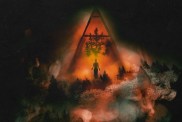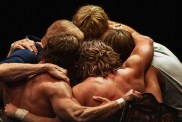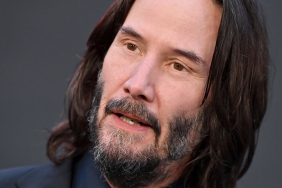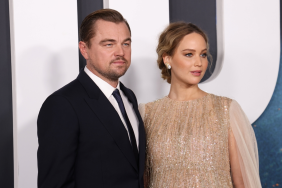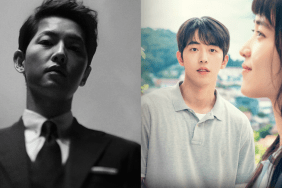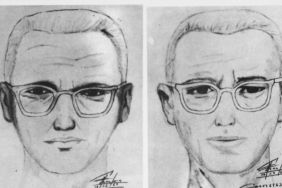The last time ComingSoon.net spoke with director Garth Jennings, he had just finished making the ambitious movie based on Douglas Adams’ The Hitchhikers’ Guide to the Galaxy. We were pretty excited to check out the second film from him and his producing partner Nick Goldsmith, collectively known as Hammer & Tongs, at this year’s Sundance Film Festival, since it’s a much more personal film for the duo, a smaller scale coming-of-age comedy featuring mainly non-actors called Son of Rambow.
The story revolves around two young boys on the outskirts of England: Will Proudfoot (Bill Milner), whose family is part of the Amish-like Plymouth Brethren religious sect, and Lee Carter (Will Poulter), a troublemaking wise-guy who finds an ally and scapegoat in the enthusiastic Will, when he decides to make a home movie to enter in a young filmmakers’ contest.
It premiered at this year’s festival and was promptly picked up by Paramount Vantage for $7 million, and ComingSoon.net had a chance to sit down with Garth and Nick just a few days after the momentous purchase of the film.
ComingSoon.net: Just to get this out of the way, “Son of Rambow” is meant to tell the origin of Hammer & Tongs, right?
Garth Jennings: It’s loosely based on actual events from my own childhood, but the reason we wanted to make it is because it sort of encapsulates everything we love, and what originally drew us into films. Just going for it, making something
This film was really very ambitious and no one really wanted to do it. Now it’s made, we feel like we were crazy, but it worked out. Originally, when I was a kid I used to make little films for my friends after seeing “First Blood” and we started making our own sequels to it, and it’s based on that.
CS: So which character were you, Will or Lee?
Jennings: I wasn’t actually either. I was a bit of Will. You know the bit where as Will starts to go to the dark side and forgets who his real friends are? I can definitely relate to that.
CS: When he went into his New Wave poser phase?
Jennings: Yeah, and then feeling utterly remorseful and doing everything like that, but no, it was based on that, but I wasn’t from a religious family, it was quite the opposite. My next door neighbors were Plymouth Brethren, but the film isn’t really about us directly at all, it’s actually these characters that we felt captured that period in these little bouts with each other.
CS: So you didn’t torture the next door neighbor’s kid and make him do stunts for your movies?
Jennings: A little bit. No, the whole film is sort of how we wanted to remember it. It’s like looking back through rose-tinted spectacles.
Nick Goldsmith: I remember I think we were trying to write another film, and it wasn’t going that well ’cause we’d never written a script before or anything, then we were having lunch downstairs, and Garth was like, “If we write down these ideas about when I was growing up and this filming thing.” We were talking about these ideas and it was like suddenly I had these flooding-back memories of just growing up, just doing stuff and not worrying about the consequences. Making camps in the woods. It was like this really nice feeling, so I think we immediately got really fired up just about that.
CS: And what did you bring specifically from your own background?
Goldsmith: We had a lot of the same things going on. I did not live next door to Plymouth Brethren, but I remember my French exchange student very well. I think it’s a quite a common thing in England. I don’t know whether they were quite as outlandish characters as Didier is in our film, but it’s how we remember it. They were different, because they didn’t wear school uniforms, so immediately they were cool. They smoked.
Jennings: It’s a heightened version of how we all sort of remember it and the effect of seeing them.
CS: I remember a lot of those things form my own childhood, so how long did you have this idea germinating before you decided to make the movie?
Jennings: Six years.
Goldsmith: We decided we were going to be able to make the movie about a year and a half in. We did a development deal with Film Four and it was going really well and we were really happy. We were actually getting to the point where we were about to start casting for the kids and then “Hitchhikers” came along. Initially we said “No,” because we wanted to make “Son of Rambow,” but then we thought about it a little more and what the opportunity was that we were being presented with, so “Son of Rambow” went on hold. We didn’t have all the money, but we were very much ready to make it.

CS: How did making “Hitchhiker’s” help making this movie even though you had a lower budget to work with this for this one?
Jennings: I think what we learned from “Hitchhikers” is we could do a lot more with less. There was an awful lot of wastage with a big film. You get to play with lots of big toys, but what it taught us was we wanted to get our hands dirty and for us all to work in a smaller crew, more hands-on. As a result, you could to a lot more, get a bigger more impressive result I supposed. That’s it in a nutshell.
Goldsmith: There was a slight worry coming off “Hitchhikers” after two years and going, “Right, let’s pull out ‘Son of Rambow’ and read it.” It was a little bit nervous, that first week, because it was like, “Is it going to be terrible?” And it was wonderful, because we read it and were like “Wow, we really do have to make this.” Just read it ourselves, just to get back into it.
Jennings: You know when you remember something being great and you think, “Was I just being romantic?”
Goldsmith: We were so energized then to go, “Right, let’s make it.” Some people advised us after “Hitchiker’s” to go do the next big movie, but it was opposite for us, it was like, “We’ve got to make this film.”
CS: Did having that big movie under your belt make it easier to get money to make “Son of Rambow”?
Jennings: No, it would have been really easy if we had wanted to make another sci-fi film, that would have been great. That would have been a smart move. No, this was really, very difficult.
CS: How about casting these kids? You went from this movie with well-known actors to this movie with mostly unknown and first-time actors. So how did you find the two kids?
Jennings: Five months, we went to all the schools in South London. All the schools were regular schools, not stage schools, and it was just a long process of meeting and auditioning a lot of children. Our casting director did the majority of the groundwork and then we would meet her selects and keep going. We did two rounds and it took, as I said, five months to find them. When we found these two kids, it was so easy, because they were so marvelous. They had no experience, they’d never done anything. They just had that natural thing, where they were very, very natural together.
Goldsmith: They’re both on the outskirts of London. They haven’t seen the film yet, but they’re very excited.
Jennings: We just finished it ten days ago, so we brought it straight out here ourselves and then we go back to England and we’ll show it to them. We spoke to them this morning.
CS: You didn’t want them to bring them to the big Sundance premiere?
Jennings: I think maybe it’s a bit too early. You’ve got to be really responsible with these guys. They’re very sweet, but they’re very young, they’re barely 13. And you know, what if it had gone badly? Actually, even this has gone really well, but that has also got its side effects.
Goldsmith: And they’d now be sitting here doing interviews
Jennings: Yeah, so we feel it was the right thing to do, but they’ll see it in a few days.
CS: Considering they are non-actors, you not only had to get them to act, but also had to get them to act poorly for the home movie part of the film.
Jennings: It was very easy. They are naturally two of the funniest children and they instinctively knew that it was funny to do bad acting. The great thing was that we could do it on video, so it was so easy. Nick and I would just shoot, so it was quick to do then watch, so they’ll just do it.
CS: What about all of the stunts they had to do? Was there a lot of CG involved with that?
Jennings: Not much CG. There’s a computer-generated arm, and there’s lots of little bits of animation, that Dave O’Reilly did. He worked with us on the animation in the “Hitchhikers” film; he did the guidebook. But then there’s quite a lot of stunts done by a smaller-sized stuntman, that’s why an awful lot of them are from a distance, but it’s all in-camera.
Goldsmith: We always loved that thing, like in “Singin’ in the Rain” when he’s just starting out in film and he’s become a stunt man, and it’s always a big wide shot [for the stunt], then you see a close-up. We were sort of inspired by that, because it’s such a lovely way of doing it.
CS: A lot of the people I saw the screening with were stunned by what the kids did in those stunts, because it looked so real. But you generally prefer to do stuff in-camera whenever possible?
Jennings: Yeah. Again, it’s that excitement of actually capturing something. It’s nice to use those computer-generated effects, like when he’s dreaming about being Son of Rambow. We certainly couldn’t have shot that. We built muscles for him, but
Goldsmith: It’s not as fun to shoot, those green screen days.

CS: Can you talk about how you did that “tennis ball scene”? That was pretty amazing.
Goldsmith: I love the reaction in the audience. I must call John Hollis and tell him.
Jennings: That again, there are actually lots of those effects that slightly push reality. That’s all a credit to our effects crew.
Goldsmith: I wouldn’t be surprised if he gets signed up by a baseball team.
CS: The coming-of-age genre is something we see a lot at Sundance, so how did you guys want to approach it differently?
Jennings: We didn’t think about it as a genre thing. We were trying to catch that thing we imagined, so it felt for us like our own childhoods. We never thought “Oh no, we must make sure it’s different or anything like that. We’d seen a load of films that we liked growing up, and we thought about them.
Goldsmith: There was quite a cross-section of films that we used as influences. “Stand By Me” was one, and “Midnight Cowboy” was one we referenced because of the relationship between Ratso and Joe Buck is very similar to the relationship in our story, so yeah, it’s quite varied, as far as where we got our influences from.
Jennings: But it wasn’t that we were trying to find a new area. It just happened.
CS: How exciting is it to be the biggest buy of this year’s Sundance Film Festival despite having a movie with no big stars?
Jennings: Well, it’s very odd. We weren’t expecting that. It’s very nice. It’s totally incomprehensible, because a lot of people didn’t think it was going to work and it was completely under the radar. It was a pleasure to do, for that very reason.
CS: How much of your crew from the music videos have you brought on to work with on your movies between this and “Hitchhiker’s”?
Goldsmith: Yeah. Our editor, the costume designer, the production designer have been working with us since day one of music videos, pretty much. It’s a tight-knit family.
CS: This movie especially seems to have a similar look and feel as some of your videos.
Jennings: I think it’s one of the lovely things we like. We’ve gotten to this sort of stage where we’re very privileged to have sort of this gang to help us make them and it really does make it fun to turn up on set, when you’ve got all your friends. They’ve become very, very dear friends of ours, so we love it.
CS: Did “First Blood” really have a big impact on the two of you?
Jennings: Yes, we joined the Army Cadets because of that film.
Goldsmith: I didn’t.
Jennings: He didn’t, but because we joined the Army Cadets, one of my friends went on to become a Royal Marine. So yes, it had a profound effect.
CS: But it didn’t lead you into a career making violence movies.
Jennings: No, it wasn’t the violence so much. It was just this guy doing everything on his own. He was so brilliant at making traps and stuff. That was kind of what it was.
CS: Has the movie stood the test of time and have either of you seen it again recently?
Jennings: Yeah. I did, actually. Have you seen it?
Goldsmith: It does stand up.
Jennings: It really does, genuinely. The later movies, they were more jokey or cartoonish. The first one still works. Everyone who worked on the film watched it and thought that it was really good.
CS: How did you get the rights to have scenes from “First Blood” in your movie?
Jennings: We asked. It’s like clearing music.
Goldsmith: You just write a letter to Mr. Stallone. “Dear Mr. Stallone
”
CS: And Stallone is doing a new Rambo movie, too, so maybe your movie can come out a week before his, so that it will help him out.
Jennings: We have an idea to do a junket with Stallone.
CS: You’ve done two movies now, both shot in England, but do you have any interest to do movies in Hollywood?
Goldsmith: We love home. I’m a big fan of doing films at home.
Jennings: We love going home at the end of the day.
Goldsmith: I don’t know. I think it’s not specific it has to be in London. I think we’re often too quick to not shoot in England, be it for financial reasons, but I still think even now, people are always too quick to go “It’s too expensive. We’ll go somewhere else. We’ll go to Australia” Well, no maybe you’ve just got to try to make it happen. People want to work, wherever you are in the world. We did talk about doing “Son of Rambow” at one point in Australia or South Africa, shooting for financial reasons, but it wouldn’t be the same film.

CS: How well did “Hitchhiker’s” end up doing over in England?
Jennings: It did great. For us, our first film? It was phenomenal. In terms of the world of blockbusters, if you threw it out there with “Pirates”
but for a wonky, weird movie, I think it’s done well. We beat “XXX” and we were like “Yeah!”
CS: Do you think they’d ever adapt any of Douglas Adams’ other movies.
Jennings: That was it. I don’t think there will be another one. I don’t think there should be, because Douglas wrote that script. I think it was hard enough making it without him and to do another one and write it from scratch would be weird.
Goldsmith: And they are strange. I mean I think the books get stranger as they go along as well. The first one is almost the most coherent and then they go completely off, so I don’t know, it’s weird, but we grew up with that stuff.
CS: What are you doing next? Are you still doing music videos?
Jennings: We’ll do some music videos; we enjoy doing that. We always have big gaps between film projects. We have absolutely no idea what were going to next, picture-wise. We’re just going to sort of go back do a few shorter pieces while we think about it. That’s the plan, anyway.
Son of Rambow was picked up by Paramount Vantage at the Sundance Film Festival and will likely get released in the United States sometimes this year.
